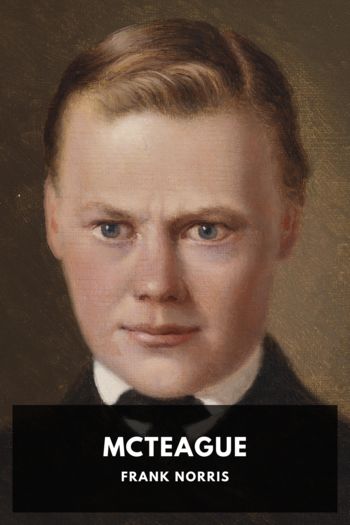McTeague, Frank Norris [polar express read aloud .txt] 📗

- Author: Frank Norris
Book online «McTeague, Frank Norris [polar express read aloud .txt] 📗». Author Frank Norris
Meanwhile, Marcus was becoming involved in the politics of his ward. As secretary of the Polk Street Improvement Club—which soon developed into quite an affair and began to assume the proportions of a Republican political machine—he found he could make a little, a very little more than enough to live on. At once he had given up his position as Old Grannis’s assistant in the dog hospital. Marcus felt that he needed a wider sphere. He had his eye upon a place connected with the city pound. When the great railroad strike occurred, he promptly got himself engaged as deputy-sheriff, and spent a memorable week in Sacramento, where he involved himself in more than one terrible melee with the strikers. Marcus had that quickness of temper and passionate readiness to take offence which passes among his class for bravery. But whatever were his motives, his promptness to face danger could not for a moment be doubted. After the strike he returned to Polk Street, and throwing himself into the Improvement Club, heart, soul, and body, soon became one of its ruling spirits. In a certain local election, where a huge paving contract was at stake, the club made itself felt in the ward, and Marcus so managed his cards and pulled his wires that, at the end of the matter, he found himself some four hundred dollars to the good.
When McTeague came out of his Parlors at noon of the day upon which Trina had heard the news of Maria Macapa’s intended marriage, he found Trina burning coffee on a shovel in the sitting-room. Try as she would, Trina could never quite eradicate from their rooms a certain faint and indefinable odor, particularly offensive to her. The smell of the photographer’s chemicals persisted in spite of all Trina could do to combat it. She burnt pastilles and Chinese punk, and even, as now, coffee on a shovel, all to no purpose. Indeed, the only drawback to their delightful home was the general unpleasant smell that pervaded it—a smell that arose partly from the photographer’s chemicals, partly from the cooking in the little kitchen, and partly from the ether and creosote of the dentist’s Parlors.
As McTeague came in to lunch on this occasion, he found the table already laid, a red cloth figured with white flowers was spread, and as he took his seat his wife put down the shovel on a chair and brought in the stewed codfish and the pot of chocolate. As he tucked his napkin into his enormous collar, McTeague looked vaguely about the room, rolling his eyes.
During the three years of their married life the McTeagues had made but few additions to their furniture, Trina declaring that they could not afford it. The sitting-room could boast of but three new ornaments. Over the melodeon hung their marriage certificate in a black frame. It was balanced upon one side by Trina’s wedding bouquet under a glass case, preserved by some fearful unknown process, and upon the other by the photograph of Trina and the dentist in their wedding finery. This latter picture was quite an affair, and had been taken immediately after the wedding, while McTeague’s broadcloth was still new, and before Trina’s silks and veil had lost their stiffness. It represented Trina, her veil thrown back, sitting very straight in a rep armchair, her elbows well in at her sides, holding her bouquet of cut flowers directly before her. The dentist stood at her side, one hand on her shoulder, the other thrust into the breast of his “Prince Albert,” his chin in the air, his eyes to one side, his left foot forward in the attitude of a statue of a Secretary of State.
“Say, Trina,” said McTeague, his mouth full of codfish, “Heise looked in on me this morning. He says ‘What’s the matter with a basket picnic over at Schuetzen Park next Tuesday?’ You know the paperhangers are going to be in the Parlors all that day, so I’ll have a holiday. That’s what made Heise think of it. Heise says he’ll get the Ryers to go too. It’s the anniversary of their wedding day. We’ll ask Selina to go; she can meet us on the other side. Come on, let’s go, huh, will you?”
Trina still had her mania for family picnics, which had been one of the Sieppes most cherished customs; but now there were other considerations.
“I don’t know as we can afford it this month, Mac,” she said, pouring the chocolate. “I got to pay the gas bill next week, and there’s the papering of your office to be paid for some time.”
“I know, I know,” answered her husband. “But I got a new patient this week, had two molars and an upper incisor filled at the very first sitting, and he’s going to bring his children round. He’s a barber on the next block.”
“Well you pay half, then,” said Trina. “It’ll cost three or four dollars at the very least; and mind, the Heises pay their own fare both ways, Mac, and everybody gets their own lunch. Yes,” she added, after a pause, “I’ll write and have Selina join us. I haven’t seen Selina in months. I guess I’ll have to put up a lunch for her, though,” admitted Trina, “the way we did last time, because she lives in a boardinghouse now, and they make a fuss about putting up a lunch.”
They could count on pleasant weather at this time of the year—it was May—and that particular Tuesday was all that could be desired. The party assembled at the ferry slip at nine o’clock, laden with baskets. The McTeagues came last of





Comments (0)